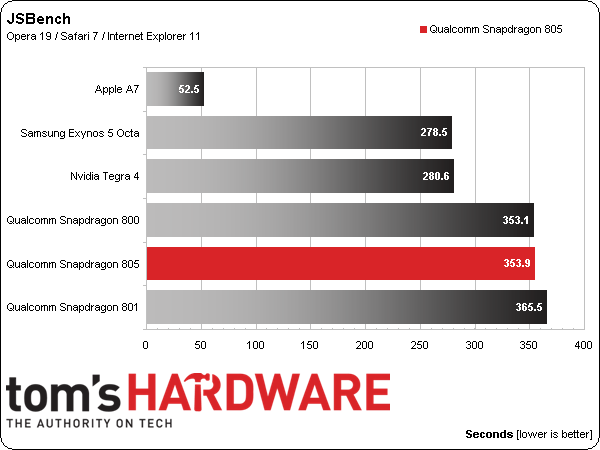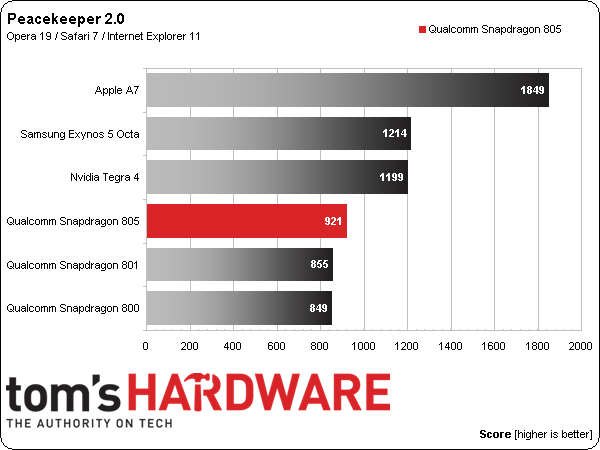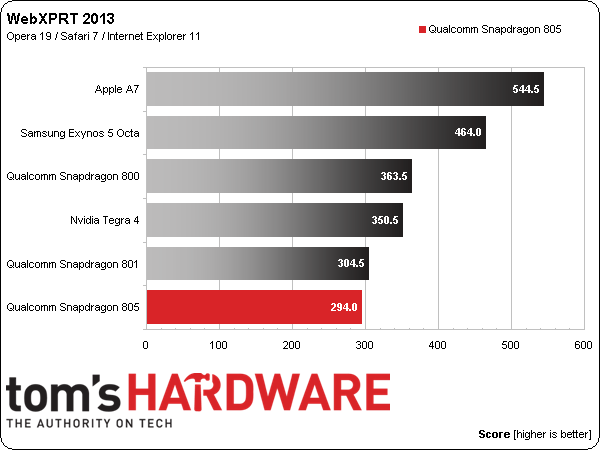Qualcomm Snapdragon 805 Performance Preview
The Snapdragon brand is synonymous with performance. It creates anxiety that competing SoCs feel deep down in their silicon substrate. But can Qualcomm's new Snapdragon 805 maintain its dominance in the Android-based smartphone market?
Results: Web Benchmarks
The tests on this page are JavaScript- and HTML5-heavy selections from our Web Browser Grand Prix series. They're extremely meaningful to mobile devices because so much of the in-app content is served via the platform's native Web browser. These tests not only offer a view of each device's Web browsing performance, but since they're traditionally so CPU-dependent, we also get a great way to compare SoC performance between platforms running the same browser software.
In order to keep the browser version even across all Android devices, we utilize a static version of the Chromium-based Opera on that operating system. Due to platform restrictions, Safari is the best choice for iOS based devices, while Internet Explorer is the only game in town on Windows RT.
JSBench
Unlike most JavaScript performance benchmarks, JSBench could almost be considered real-world, since it utilizes actual snippets of JavaScript from Amazon, Google, Facebook, Twitter, and Yahoo!.
The results from this benchmark align perfectly by CPU architecture, with Krait trailing both Apple’s A7 and the two Cortex-A15-based CPUs. JSBench appears indifferent to the number of cores (the A7 is dual-core and the others are quad-core) and frequency. These results highlight the complexities of designing a modern CPU. Sometimes taking the “easy” approach of adding more cores or bumping clock frequency just doesn’t produce any tangible benefits if the design is bottlenecked elsewhere.
Peacekeeper
Peacekeeper is a synthetic JavaScript performance benchmark from Futuremark.
Once again, the results organize themselves based on CPU architecture, with Krait producing the lowest scores. Snapdragon 805 does manage an 8% improvement over the 801, likely due to its higher memory bandwidth.
WebXPRT 2013
Principled Technologies' WebXPRT 2013 is an HTML5-based benchmark that simulates common productivity tasks that are traditionally handled by locally-installed applications, including photo editing, financial charting, and offline note-taking.
Get Tom's Hardware's best news and in-depth reviews, straight to your inbox.
Another benchmark yields another inconsistent result from Qualcomm's newest Snapdragon. In this HTML5-based test, Snapdragon 800 scores 16% higher than the 801 and 19% higher than the 805, again suggesting that the higher-clocked Krait cores aren't spending much time at their peak clock rates.
Current page: Results: Web Benchmarks
Prev Page Results: CPU Core Benchmarks Next Page Results: GPU Core Benchmarks-
blackmagnum Trying not to be an Apple fanboy, but their A7 processor supports 64-bit instructions since last year. They lead innovation due to their clientele having more open-ended budget for the device than Android users (can't remember link to the study).Reply -
JOSHSKORN Did I read that right? There won't be ANY 64-bit Android Phones until 2015? It's going to take practically TWO YEARS to play catch-up to the iPhone? Mind you, most iPhone users don't know the difference between 32-bit and 64-bit, anyway, but it's "better" and that their logic for upgrading. Preying on stupid people basically has become (or always has been?) Apple's business model, and it's paid off. Sometimes, I wish I wasn't anti-Apple. C'mon, Android...get with the program!Reply -
rantoc Just find it funny tragic that more and more phone displays are almost at the same resolution as in many general desktop PC's.Reply
Also find it funny that their marketing team dare to call this "Ultra HD", would be fun to see a benchmark of this running that 4k resolution in any 3D descent detail benchmark=P
"It actually approaches what a fairly modern desktop CPU's integrated memory controller can do. All of this extra memory bandwidth isn’t for the CPU, though. It's reserved for Qualcomm’s new Adreno 420 GPU."
Yeah mostly is for the GPU, where a modern PC gpu alone pushes well over 300gb/sec. Close no? =P -
Memnarchon Dam! And I was hoping to see K1 on these benchmarks too, for a comparison. Oh well...Reply -
ta152h Is it too difficult for you guys to write a consistently good and accurate article? It's like you do the hard stuff, and then screw up details.Reply
For example, why are some charts from 0 to somewhere above the max score, and others start at, for example, 2300 and go to 3000.
I realize you guys aren't really computer people from this terrible lack of attention to detail (which someone who does more than write about computers has to have as a personality flaw), but can't you hire someone that can look over this stuff, and at least try to present it in a consistent way? Writers who aren't computer people make these types of mistakes, because their minds aren't ordered enough, but you guys really need someone like that, because all the articles suffer from imprecision and lack of clarity (and over use of words like 'alacrity', which really implies emotion, and isn't a true synonym for speed. Again, precision ...)
For example, I'm looking at charts, and am shocked by some, then realize it's just because you guys screwed up the scaling, and can't stay consistent.
Don't worry, a chart that shows very little difference because you used the full scale isn't bad. Because, if you really think about it, neither is the performance, and if you can't see a big difference in the chart, you aren't going to see a big difference in the performance. But, when you see one bar over three times longer than another, and the real difference is less than 20%, don't you think that gives the wrong impression?
If you do all the hard work, and then screw up details, it's just not as good as it could be. And yes, I've learned these sites like to say things in a way it is correct, but then present it in a manner which gives the opposite impression. Try writing without bias, and maybe this will go away. Charts are one way, comparing Kabinis with Haswells are another. Commenting more on charts that read what you want, while just presenting charts you don't like the results of, are another way. Or commenting on the part of the chart you like, while ignoring the part you don't. It's not as subtle as you might think, or maybe it is, and you don't even realize your bias. But we do.
I used to love this site, especially when Thomas Pabst used to write in his crazy way. But, it's slowly, and inexorably getting worse. There are better sites now. Maybe skip the really bad car reviews (do you really think your opinions even approximate professional sites like Car and Driver? At all? ) and focus more producing better quality computer articles. It should be easy, you guys get a lot of good information, often do reviews that people want but other sites skip, but then screw it up with a lack of attention to detail and consistency.
-
esrever I find the inconsistency makes most of this completely pointless until the software gets actually optimized and the drivers start working.Reply -
hannibal Well I really expect new article in near future where Tegra K1 and 805 are against each other. And then 810. It is interesting to see what 64bit computing will bring to mobile platforms... Mobile gaming is getting quite serious in next few years!Reply
-
irish_adam I dont see why you are all so impressed with 64bit. I mean if you believe that the A7 is super amazing because it is 64bit then you're an idiot. The fact that its 64bit adds minimal performance and is 100% gimmick and just so that they can claim to be the first.Reply
It reminds me of when AMD released their first 64bit chips and microsoft released XP64, you soon realised that unless you had 4gb or more of ram then there was no difference (well except that none of your hardware drivers would work grrrr).
Why would Qualcomm rush out a 64bit chip when there isnt any real improvement to be had? surely its better that they focus on things that will actually improve performance and battery life? I mean they havent even finished a 64bit version of android yet so what would it even run on? Until we see the need for more than 4gb of ram on phones then i really dont see the point


